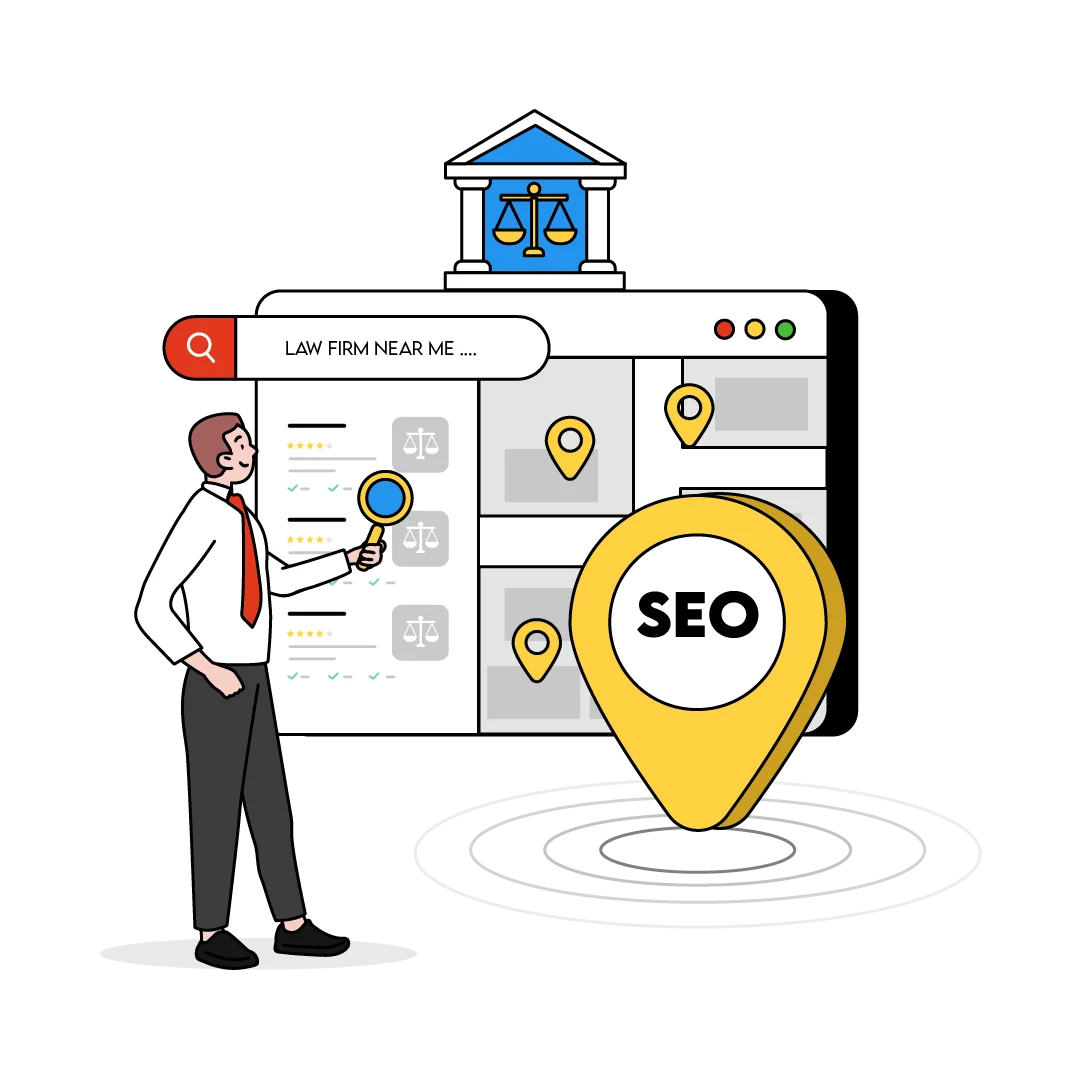To elevate your law firm’s visibility on Google and attract the right clientele, Search Engine Optimization (SEO) is a crucial strategy.
Consider SEO your firm’s digital megaphone, ensuring that when potential clients search for terms like “divorce lawyer near me” or “estate planning attorney,” your firm stands out rather than getting lost among competitors.
While SEO is a mid to long-term investment, the benefits are significant. Effective SEO builds credibility, enhances your online footprint, and generates a consistent stream of qualified leads.
In this guide, we’ll break down:
- What SEO is and why it matters
- How SEO works, including search intent and Google’s ranking factors
- Key strategies like Local SEO, Google My Business optimization, and content structure
- Additional tactics to boost your visibility, like reviews, content marketing, and link building
Looking for help with your SEO strategy — or just don’t have the time? Keoch is a leading digital marketing agency that specializes in working with law firms. Whether you’re a small practice or a large firm, we know what it takes to get your website ranking higher and bring in new clients. Learn more about our digital marketing services for law firms here.
What Is SEO and Why Is It Important for Law Firms?

SEO is all about optimizing your website so that it ranks higher in search results — without paying for ads. Unlike PPC (Pay-Per-Click), SEO is a long-term strategy. It takes time and consistency, but once your website gains traction, SEO can drive steady leads to your firm.
The legal industry is highly competitive online. Every day, potential clients are searching for terms like “personal injury lawyer” or “business attorney near me.” Without SEO, your firm risks being buried under competing websites.
A strong SEO strategy helps your firm stand out in search results so you’re seen by people who need your services most. By targeting the right keywords, building quality content, and optimizing your site for local search, your firm can attract more qualified leads and grow your client base.
SEO is a long-term investment.
If you’re looking for overnight results, SEO isn’t it. But if you’re willing to commit to consistent updates and content creation (with the support of an agency if required), SEO can provide long-lasting visibility that continues to bring in leads.
How Does SEO Work?
SEO is all about understanding what people are searching for and making sure your website shows up as the best answer. Google determines which content to rank more highly by analyzing a range of factors, with a strong focus on relevance, authority, and user experience.
Understanding Search Intent
Google’s goal is to deliver content that directly aligns with what a user is looking for. For example:
- If someone types “divorce lawyer near me,” they’re likely ready to hire someone — so Google prioritizes local law firms.
- If someone searches “how to file for divorce,” they’re looking for information — meaning helpful blog content is more likely to rank.
That means it’s a good idea for your law firm website to have clear information on your location and services, as well as helpful content in the form of blogs and articles. This approach ensures you’re meeting the needs of both types of searchers — those looking for immediate legal help and those seeking educational information.
How Google Ranks Content
When Google decides which pages to rank, it looks at several key factors to ensure searchers are finding helpful, relevant, and trustworthy information. One essential framework Google uses is E-E-A-T — which stands for Experience, Expertise, Authoritativeness, and Trustworthiness.
For law firms, this means:
- Sharing content that demonstrates your legal knowledge and experience
- Establishing authority through case studies, credentials, and media features
- Building trust with client reviews, clear contact details, and accurate information
In addition to E-E-A-T, Google also considers:
- Relevance: Does your content match what someone’s searching for?
- Authority: Are reputable websites linking to your content?
- User Experience: Is your site fast, easy to use, and mobile-friendly?
Local SEO for Legal Professionals

Local SEO is one of the most powerful tools law firms can use to attract nearby clients. When people search for terms like “family lawyer near me” or “business attorney in [City],” Google prioritizes firms that have a strong local presence.
Optimize Your Google My Business Profile
Your Google My Business (GMB) profile is one of the most important elements of Local SEO. When someone searches for terms like “lawyer near me,” Google often shows a local map pack at the top of the results — and your GMB profile is what determines if you appear there.
Creating or claiming your GMB profile is the first step, but optimization is key. Make sure your profile includes:
- Accurate Business Information: Ensure your firm’s name, address, and phone number (NAP) match what’s listed on your website.
- Office Hours: List your regular and holiday hours.
- Practice Area Details: Add descriptions of your services and areas of expertise.
- Photos: Showcase your office, team, and building exterior to create a welcoming impression.
- Reviews: Encourage satisfied clients to leave reviews, and respond thoughtfully to all feedback to demonstrate engagement and trustworthiness.
Create a Clear and Detailed Contact Page
Even if your firm has just one location, having a dedicated Contact Page on your website is essential for Local SEO. Your Contact Page should include:
- Address, phone number, and office hours for each location (*do not include virtual locations)
- Directions and parking details
- Clear details on which services or areas of expertise are available at each office
If you have multiple locations that serve different regions or specialize in distinct practice areas, consider adding subpages with additional details for each office.
This ensures potential clients — and search engines — have everything they need to understand where and how you can help.
Get Listed in Local and Legal Directories
Getting your law firm listed in trusted directories can boost your local SEO and improve your credibility.
Start by adding your firm to well-known legal directories like Avvo, FindLaw, and Justia. These platforms are popular with people searching for legal services and are trusted by Google. Additionally, ensure your firm appears in local business directories such as Google Maps, Yelp, and the Better Business Bureau.
For best results:
- Keep your Name, Address, and Phone Number (NAP) identical across all listings.
- Provide clear descriptions of your services and practice areas.
- Encourage happy clients to leave positive reviews wherever possible.
Consistent and accurate directory listings increase your firm’s chances of appearing in local search results and make it easier for potential clients to find you.
On-Page SEO for Law Firms

On-page SEO is all about optimizing the content and structure of your website to improve search rankings. For law firms, this means creating a clear, well-organized site that provides both search engines and potential clients with the information they need.
Site Structure
A clear site structure helps both users and search engines navigate your website. Organize your pages into logical categories:
- Homepage: Introduce your firm with a clear value proposition.
- Practice Area Pages: Create dedicated pages for each area of expertise to ensure potential clients can find detailed information on their specific needs.
- Contact Page: Include clear directions, contact details, and office hours.
About Page
Your About Page is an opportunity to build trust with potential clients. Showcase:
- Your Firm’s History: Share your background and why you practice law.
- Experience and Credentials: Highlight achievements, certifications, and awards.
- Values and Approach: Explain how your firm supports clients and what sets you apart.
Including professional headshots and brief bios of your attorneys can further establish credibility and make your firm feel approachable.
Service/Expertise Pages
Create detailed pages for each practice area you specialize in. Each page should include:
- An Overview of the Practice Area: Describe the types of cases you handle.
- Frequently Asked Questions: Anticipate client concerns and provide clear answers.
- Call to Action: Encourage visitors to contact your firm for assistance.
Adding internal links between related practice area pages and blog content will further improve your site’s structure and keep visitors engaged.
Optimizing Content for SEO
It’s not just about having the right content — it’s also how it’s written. Optimizing content for SEO involves:
Keyword Strategy
Identifying relevant keywords and incorporating them naturally into your content is essential. Use keyword research tools like Google Keyword Planner, Ahrefs, or SEMrush to find terms your potential clients are searching for. Place keywords in key areas like page titles, headings, URLs, and throughout your content in a natural way. Avoid keyword stuffing — focus on creating useful, clear content that answers client questions while integrating keywords thoughtfully.
Clear Structure
Breaking your content into clear sections improves readability for both visitors and search engines. Use headings (H1, H2, etc.) to organize your content, and break up text with bullet points, short paragraphs, and white space. This helps readers quickly find the information they need while giving search engines clear signals about your content’s structure.
Proper Titles
Your page titles are crucial for SEO. Write clear, keyword-rich titles that describe the content of each page. Include relevant terms like “[City] Divorce Lawyer” or “Estate Planning Attorney Services” to improve rankings and attract potential clients.
Meta Descriptions
Meta descriptions are brief summaries that appear in search results. Write concise, compelling descriptions that include target keywords and encourage users to click. Focus on clear language that explains what your page offers and why it’s valuable.
Internal Links
Internal links help visitors navigate your site while guiding search engines to understand your content structure. They distribute page authority across your website, improving rankings for important pages. Linking related content, like connecting a ‘Divorce Law’ service page to a blog post on preparing for divorce, strengthens your site’s SEO. Thoughtful linking improves user experience and keeps visitors engaged longer.
Technical Elements
Technical SEO plays a vital role in helping search engines crawl, index, and rank your content effectively. This includes elements like schema markup (which adds structured data to help search engines understand your content), URL structure (keeping URLs clear and keyword-rich), and image optimization (using descriptive file names and alt text).
Learning SEO optimization isn’t rocket science, but it does take time and attention to detail. Many law firms find it’s worth partnering with a digital marketing agency to help ensure their content is optimized effectively and consistently.
What Else You Can Do for SEO

Content Marketing
Creating informative blog posts that answer common legal questions can establish your firm as a trusted resource. Blog content that addresses client concerns, offers practical advice, or explains legal processes can attract organic traffic and build credibility.
Social Media
While social media doesn’t directly impact SEO rankings, platforms like LinkedIn are powerful tools for showcasing your expertise. By sharing thought leadership, firm updates, and success stories, you can build trust with potential clients and encourage visits to your website.
Link Building
Encouraging backlinks from reputable legal websites, local publications, and industry partners can improve your website’s authority in Google’s eyes. Quality backlinks signal that your firm is a trusted resource, improving your chances of ranking higher in search results.
Reviews and Reputation Management
Client reviews play a major role in both SEO rankings and consumer trust. Encourage satisfied clients to leave reviews on platforms like Google, Avvo, and Yelp. Responding to reviews — both positive and negative — shows that you value client feedback and helps build trust with potential clients.
SEO Experts for Law Firms
At Keoch, we specialize in law firm website search engine optimization. We’ve worked with legal professionals to create optimized content, improve site structure, and build strategies that connect firms with the right clients. Whether you’re looking to rank higher in local searches or expand your digital presence, our team has the experience and tools to get results.
Contact Keoch today to learn more about our SEO services for attorneys.
FAQs About Law Firm SEO
How long does SEO take to work?
SEO is a long-term strategy. While some improvements may be noticeable in a few weeks, significant results often take 3 to 6 months or longer.
What’s the difference between SEO and PPC?
SEO focuses on improving your website’s organic rankings, while PPC (Pay-Per-Click) ads offer immediate visibility for paid search terms.
Should I hire a law firm SEO expert?
Partnering with an SEO expert or digital marketing agency can save you time and ensure your strategy follows best practices.
How important are client reviews for SEO?
Client reviews are crucial for improving your firm’s reputation and search rankings.







